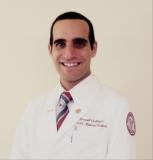Medical Student Perspectives: The White Coat & the Road to Medical School
As I sit under this huge white tent with hundreds of people around me and anxiously wait to be called up to receive my white coat, I look back at all of the hard work and effort it took to reach this spot.
I remember my anticipation when I started college a few years ago; I wondered what lay ahead. As I began the long journey to becoming a physician, I wondered, "Will I make it? Will I survive the rigors of learning chemistry, biology, organic chemistry—all difficult subjects—while I maintain a competitive grade point average?"
I sat down with my advisors to choose my courses for the semester and map out my courses for the next few years. The first semester flew by, as did the next several years. Meanwhile, I began volunteering, shadowing physicians and gaining as much exposure as possible to the field of medicine. If this was going to be my career path, then I wanted to make sure that it was something about which I was most passionate. Every experience that I had helping people, observing physicians, and performing research made me more and more passionate about becoming a Doctor of Medicine.
Before I knew it, the next daunting hurdle came: the Medical College Admission Test. I sat down and prepared for a few weeks and reviewed all of the relevant material in order to do well. I took the test, and then the next step began: applying to medical school while anxiously waiting the 30 days for the results.
I spent hours filling out applications and writing personal statements. After I tweaked and revamped the contents of my application seemingly hundreds of times, I finally submitted it. After I was validated by the American Medical College Application Service, I received a slew of e-mails from prospective schools instructing me to fill out secondary applications with more personal statements and information. After I completed these applications, the next stage began: waiting and hoping for an interview.
After getting an interview, I waited longer to see whether I was accepted. Day by day, I checked my e-mail hoping to find an acceptance letter. When it finally came, I couldn't believe it. My family and friends, who had been so supportive throughout this process, congratulated me on my success and reaffirmed that I would make a great physician.
The euphoria of acceptance quickly changed into fear and panic as I realized how much I must do to prepare for medical school. As orientation day neared, though, my excitement resumed. It was time to meet my new colleagues-the people with whom I would be spending the next four years of my life.
Again, my fears from college crept back into my mind: Would I make it? Would I be able to survive the rigors of learning anatomy and histology in only three months? If I wasn't at the top of the class, would I still be a competent physician?
Orientation week came and went, and, before I knew it, I was sitting in the lecture hall listening to an anatomy lecture. All of a sudden, a realization sunk in and I thought to myself, "I'm actually in medical school. I made it. I will soon be a doctor."
The anatomy laboratory began, and I was introduced to my first "patient-cadaver." This cadaver would probably be the one person from whom I would learn the most during my time in medical school. I made the first incision with care and caution, as if I was worried about injuring the cadaver.
Little by little, I went deeper and deeper inside the human body. I thought to myself, "This is the human body-the most amazing and intricate 'machine'-and I have the privilege to learn as much as I can in order to help when things go awry."
So, as I sit here in this white tent, with rain pouring down and drowning out the voice of the speaker as he recites the Hippocratic Oath, I smile to myself and appreciate all of the accomplishments and sacrifices that I made to get where I am today. But now I am faced with new questions: What does this white coat represent? What kind of responsibilities do I now possess?
This white coat is my rite of passage. People will now respect what I say, so I have a responsibility to make sure that what I tell them is correct. I have a responsibility to help any person no matter what his or her ethnic group, race, or belief. I have a responsibility to be honest, sincere, professional, and compassionate. I have a responsibility to learn as much as I can in order to be the most competent physician that I can be.
We each have our journey, our excitements, our pitfalls, our ups, and our downs. Whichever path that we each took to get here was the right one. The next time that we don our white coats, we should take a moment to reflect on the hard work that brought us here. We should not only realize that the road ahead will have the same bumps and depressions as the road that brought us here but also have faith in our abilities to overcome those hardships. We made it this far, and we each will continue to pave our paths in the road that we call life.
|
|


 shmuel_golfeyz@nymc.edu
shmuel_golfeyz@nymc.edu